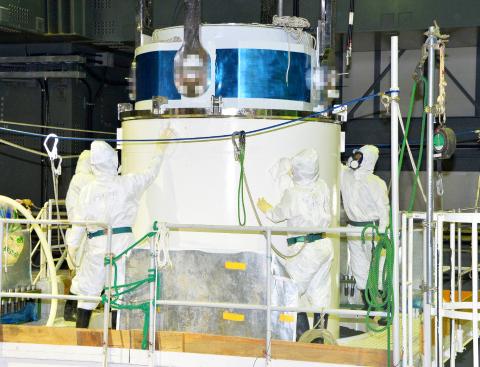The cleanup of Japan’s devastated Fukushima Dai-ichi nuclear power plant passed an important milestone on Saturday when the plant’s operator announced it had safely removed the radioactive fuel from the most vulnerable of the four heavily damaged reactor buildings.
Tokyo Electric Power Co (TEPCO) removed the remaining fuel rods from the ruined No. 4 reactor building, putting the rods inside a large white container for transportation to another, undamaged storage pool elsewhere on the plant’s grounds. The company had put a high priority on removing about 1,500 fuel rods from the unit because they sat in a largely unprotected storage pool on an upper floor of the building, which was gutted by a powerful hydrogen explosion during the March 2011 accident.
This led to fears of additional releases of radioactive material if the pool was damaged further, such as by an earthquake. By succeeding in the technically difficult task of extracting the rods, TEPCO eliminated one of the plant’s most worrying vulnerabilities. This is also the first time that fuel has been removed from one of the four wrecked reactor buildings.

Photo: AFP
It took almost four years to reach this goal, as the cleanup has been plagued by mishaps and a so far unstoppable flow of groundwater that has flooded the basements of the crippled reactor buildings.
The aging Fukushima Dai-ichi plant suffered a triple meltdown when a huge earthquake and tsunami struck on March 11, 2011, knocking out cooling systems.
TEPCO still faces the far more challenging task of removing the ruined fuel cores from the three reactors that melted down in the accident. These reactors were so damaged — and their levels of radioactivity remain so high — that removing their fuel is expected to take decades. Some experts have said it might not be possible at all, and have called instead for encasing those reactors in concrete.
The fuel cores from the three reactors are believed to have melted like wax as the uncooled reactors overheated, forming lumps on the bottom of the reactor vessels. Scientists have said that the hot, molten uranium might have even melted through the containment vessels, possibly reaching the floor of the reactor buildings or even the earth beneath.

The CIA has a message for Chinese government officials worried about their place in Chinese President Xi Jinping’s (習近平) government: Come work with us. The agency released two Mandarin-language videos on social media on Thursday inviting disgruntled officials to contact the CIA. The recruitment videos posted on YouTube and X racked up more than 5 million views combined in their first day. The outreach comes as CIA Director John Ratcliffe has vowed to boost the agency’s use of intelligence from human sources and its focus on China, which has recently targeted US officials with its own espionage operations. The videos are “aimed at

STEADFAST FRIEND: The bills encourage increased Taiwan-US engagement and address China’s distortion of UN Resolution 2758 to isolate Taiwan internationally The Presidential Office yesterday thanked the US House of Representatives for unanimously passing two Taiwan-related bills highlighting its solid support for Taiwan’s democracy and global participation, and for deepening bilateral relations. One of the bills, the Taiwan Assurance Implementation Act, requires the US Department of State to periodically review its guidelines for engagement with Taiwan, and report to the US Congress on the guidelines and plans to lift self-imposed limitations on US-Taiwan engagement. The other bill is the Taiwan International Solidarity Act, which clarifies that UN Resolution 2758 does not address the issue of the representation of Taiwan or its people in

US Indo-Pacific Commander Admiral Samuel Paparo on Friday expressed concern over the rate at which China is diversifying its military exercises, the Financial Times (FT) reported on Saturday. “The rates of change on the depth and breadth of their exercises is the one non-linear effect that I’ve seen in the last year that wakes me up at night or keeps me up at night,” Paparo was quoted by FT as saying while attending the annual Sedona Forum at the McCain Institute in Arizona. Paparo also expressed concern over the speed with which China was expanding its military. While the US

SHIFT: Taiwan’s better-than-expected first-quarter GDP and signs of weakness in the US have driven global capital back to emerging markets, the central bank head said The central bank yesterday blamed market speculation for the steep rise in the local currency, and urged exporters and financial institutions to stay calm and stop panic sell-offs to avoid hurting their own profitability. The nation’s top monetary policymaker said that it would step in, if necessary, to maintain order and stability in the foreign exchange market. The remarks came as the NT dollar yesterday closed up NT$0.919 to NT$30.145 against the US dollar in Taipei trading, after rising as high as NT$29.59 in intraday trading. The local currency has surged 5.85 percent against the greenback over the past two sessions, central